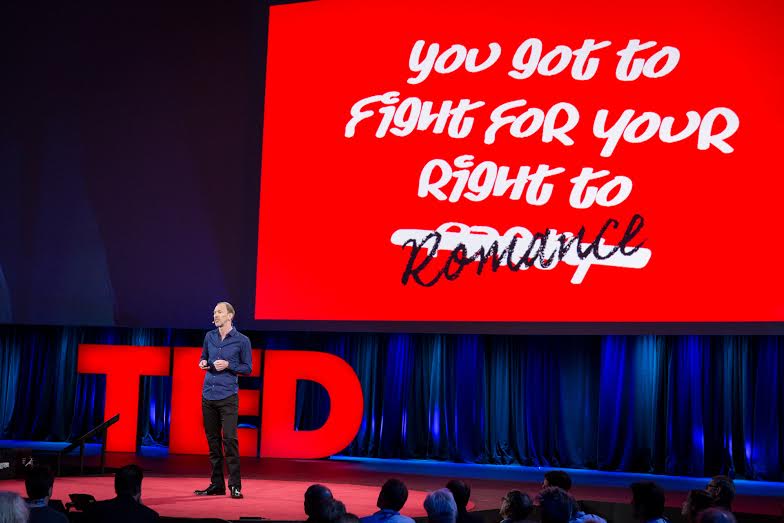How Romance Can Help Grow Your Business

I’m an advocate for romance at work—but that’s not what you think. I’m referring to the state of being in which we feel thrillingly alive, as if all of our senses are on over-drive. Romance makes everything feel new, exciting, and full of possibility.
But romance is at just about the other end of the spectrum from business. In fact, in business we typically strive to eliminate everything associated with romance—important qualities such as surprise, vulnerability, and loss of control. We establish processes and routines to minimize risk. We are expected to stay the course and remain level-headed. But this places serious limitations on innovation and ultimately hurts your brand and workplace culture.
Here’s why more romance is good for you and your company:
A happier, more motivated you
Employees worldwide feel disenchanted at work. According to a 2013 Gallup poll, only 13 percent of respondents identified themselves as “fully engaged.” Trust in business leaders is also at the lowest level since the 2008 financial crisis.
This disconnect is aggravated by technologies that allow us to measure everything so we can optimize it. Productivity-focused telematics, mood monitoring, sociometric tools like Meeting Mediator that help observe and manage social dynamics at work, or peer-based open performance monitoring systems like Better Works—experts tout the “algorithmic CEO,” “algorithmic HR,” and the “quantified self going corporate” as the future of business.

Some consider these applications a form of “Digital Taylorism,” worried not only about privacy issues but also a dehumanization of the workplace experience. And indeed, when we delegate our emotions to machines and make our experiences more predictable we don’t get those moments of insight that illuminate and expand our daily routines. When we automate, standardize, and attempt to eliminate the unknown, we engineer the romance right out of our lives. The fully data-driven, the fully quantified workplace will be a fullyjoyless one.
It doesn’t have to be this way. You can start by using romantic hacks that defy your modus operandi and break up corporate routines. Try attending a Daybreaker event to dance with other professionals in the early morning; talk to strangers on your way to work (research shows it will increase your happiness); swap desks (even roles) with colleagues; institute “I Am Here Days” to pursue a single task with one person, rather than many. Follow the lead of companies like Amazon, Samsung, Salesforce.com, and Zappos which have all begun to engineer serendipity into their workplaces to spur innovation and delight.
These activities inject mystery and adventure into the workday. They also generate moments of attachment and intimacy, and we know from marriage researchers that these exchanges are critical for healthy relationships.
More devoted customers
Romance is a genuine differentiator in a world thriving on maximization and optimization. Some companies have discovered the beauty of things that don’t scale, creating customer experiences that are intentionally ephemeral, ambiguous, and mysterious. They defy the principles of efficiency and convenience in order to enchant customers in unique and moving ways.
Detour, for example, is an app for location-based audio walking tours, which allows users to explore the world around them with fresh eyes. Airbnb rewards customers for “Random Acts of Hospitality” (“Try to make a stranger laugh”; “Give a stranger in passing a high-five”). UK-based Secret Cinema runs “mystery screenings,” naming locations on short notice. Dutch airline KLM offered Monday’s Mystery Tickets—with the destination revealed a day after purchase—for a limited time.
Underground supper clubs, Burning Man, Snapchat, and Pop-Up Magazine (which just hosted a stunning session at this year’s TED conference) all take advantage of our attraction to transitory experiences.
A more human enterprise
Business romance reveals a world in which you can be a different person every day, yet still be trusted. It gives you the freedom to follow your heart and change your mind. It can nurture your desire for communion beyond community, for catharsis over consumption, and it provides the necessary space to revel in silliness and absurdity alongside data-based logic.
This new romantic way of doing business can emerge grass-roots style, bottom-up. But surely, it helps if your CEO is attuned to such sensitivity. To find such leader, we need look no further than Microsoft, of all companies: Since taking the helm at Microsoft, Satya Nadella has exhibited a leadership style of humility and vulnerability, including regular tweets that draw from the liberal arts. Wired called it “warm, fuzzy, and slightly bonkers.” Now, for a romantic, that’s a compliment.
Business is the main operating system in our society, which is why business people are primed to be the great romantics of our time. Business romantics know that a lack of innovation signals a dearth of imagination. They know that truly loyal customers want more than just solutions to problems. They know that uninspired employees desire more than purpose and perks. And they know this most of all: to romanticize the enterprise is to humanize it.
Tim Leberecht is the author of the book The Business Romantic and the chief marketing officer of NBBJ, a global design firm.His 2012 TED Talk “3 Ways to (Usefully) Lose Control of Your Brand” was viewed more than 800,000 times.
He spoke at the TED Conference in Vancouver last week on the “The Other Office Romance.”
Top photo: James Duncan Davidson, for TED; painting by Caspar David Friedrich, treatment by: Megan Lynch